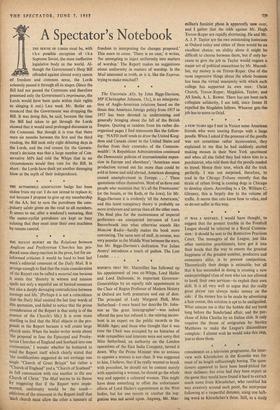The Uncertain Ally, by John Biggs-Davison, MP (Christopher Johnson, 15s.),
is an interpreta- tion of Anglo-American relations based on the thesis that American foreign policy from 1917 to 1957 has been devoted to undermining and generally bringing about the fall of the British Empire. Quoting at random from his rather dis- organised pages I find statements like the follow- ing: 'NATO itself tends to draw the United King- dom and Canada closer to the United States and further from their comrades of the Common- wealth'; 'A Republican Administration continued the Democratic policies of internationalist expan- sion in Europe and elsewhere'; 'American mass production turned out far more than could be sold at home and sold abroad. American dumping caused unemployment in Europe. . . .' These quotations refute themselves. Most of us have met people who maintain that 'it's all the Freemasons' (or the Jesuits, or the Reds, or the Jews); for Mr. Biggs-Davison it is evidently `all the Americans,' and this latest conspiracy theory is probably no more irrelevant and untrue than all the other ones. The final plea for the maintenance of imperial preference—an unexpected intrusion of Lord Beaverbrook into what otherwise sounds like Moscow Radio—hardly makes the book more convincing. The same sort of stuff, in reverse, was very popular in the Middle West between the wars, but Mr. Biggs-Davison's dedication 'For Julian Amery' introduces a touch of pathos. The Lost Leader. . . .


































 Previous page
Previous page